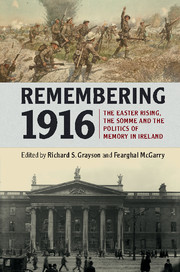Book contents
- Frontmatter
- Contents
- List of figures
- List of tables
- List of contributors
- Introduction
- Part I Memory and commemoration
- Part II Narratives
- 4 Instant history: 1912, 1916, 1918
- 5 Hard service: remembering the Abbey Theatre's rebels
- 6 Beyond the Ulster Division: West Belfast members of the Ulster Volunteer Force and Service in the First World War
- 7 Remembering 1916 in America: the Easter Rising's many faces, 1919–1963
- Part III Literary and material cultures
- Part IV Troubled memories
- Index
5 - Hard service: remembering the Abbey Theatre's rebels
from Part II - Narratives
Published online by Cambridge University Press: 05 March 2016
- Frontmatter
- Contents
- List of figures
- List of tables
- List of contributors
- Introduction
- Part I Memory and commemoration
- Part II Narratives
- 4 Instant history: 1912, 1916, 1918
- 5 Hard service: remembering the Abbey Theatre's rebels
- 6 Beyond the Ulster Division: West Belfast members of the Ulster Volunteer Force and Service in the First World War
- 7 Remembering 1916 in America: the Easter Rising's many faces, 1919–1963
- Part III Literary and material cultures
- Part IV Troubled memories
- Index
Summary
You have given us the most important part of history – its lies … I don't believe that events have been shaped so much by the facts as by the lies that people believed about them.
W. B. Yeats to Lady Gregory, on reading her autobiographical account of the Easter Rising.
I
On 23 July 1966, the Taoiseach Seán Lemass addressed an audience at the Abbey Theatre to pay tribute to seven rebels who had fought in the Easter Rising. They included the actor Sean Connolly, who led the opening attack against Dublin Castle; Máire Nic Shiubhlaigh, the Abbey's first leading lady who had served at Jacob's factory; and Helena Molony, who fought with the Citizen Army. The best known were the Abbey Theatre's former prop-man, Peadar Kearney, author of the Irish national anthem, and the Hollywood actor Arthur Shields. Largely forgotten by then were the theatre's long-serving usher, Nellie Bushell, and Barney Murphy, a former stage-hand who had fought at the Four Courts but was remembered at the Abbey as the prompter with no respect for dramatic pauses.
Only two remained alive. Molony, frail and wheelchair-bound, attended the ceremony. She died several months later. Unable to travel from California due to ill-health, Arthur Shields was represented by his daughter Christine. Relatives of the deceased rebels attended the ‘brief, dignified, ceremony’. The presence of Máire Nic Shiubhlaigh's sister, Gypsy, her brother Frank, and the 86-year-old carpenter, Sean Barlow, represented the Abbey's last living links to the turn-of-the-century cultural revival. The quote inscribed on the cheap plaque – ‘It is hard service they take that help me’ – came from Cathleen ni Houlihan, the 1902 play which, more than any other work in the Abbey's repertoire, symbolised the link between the revival and the Irish revolution. Set in 1798, the Year of the French, Yeats's and Lady Gregory's powerful evocation of the willingness of young men to sacrifice their lives had been widely credited with popularising insurrectionary ideals among the younger generation which brought about the rebellion of 1916.
Yeats, admittedly, had a hand in promoting this notion. When he accepted his Nobel Prize in 1923, he insisted that the political revolution had been a product of the literary revival in which he and the Abbey's founders had played such a central role.
- Type
- Chapter
- Information
- Remembering 1916The Easter Rising, the Somme and the Politics of Memory in Ireland, pp. 86 - 111Publisher: Cambridge University PressPrint publication year: 2016



